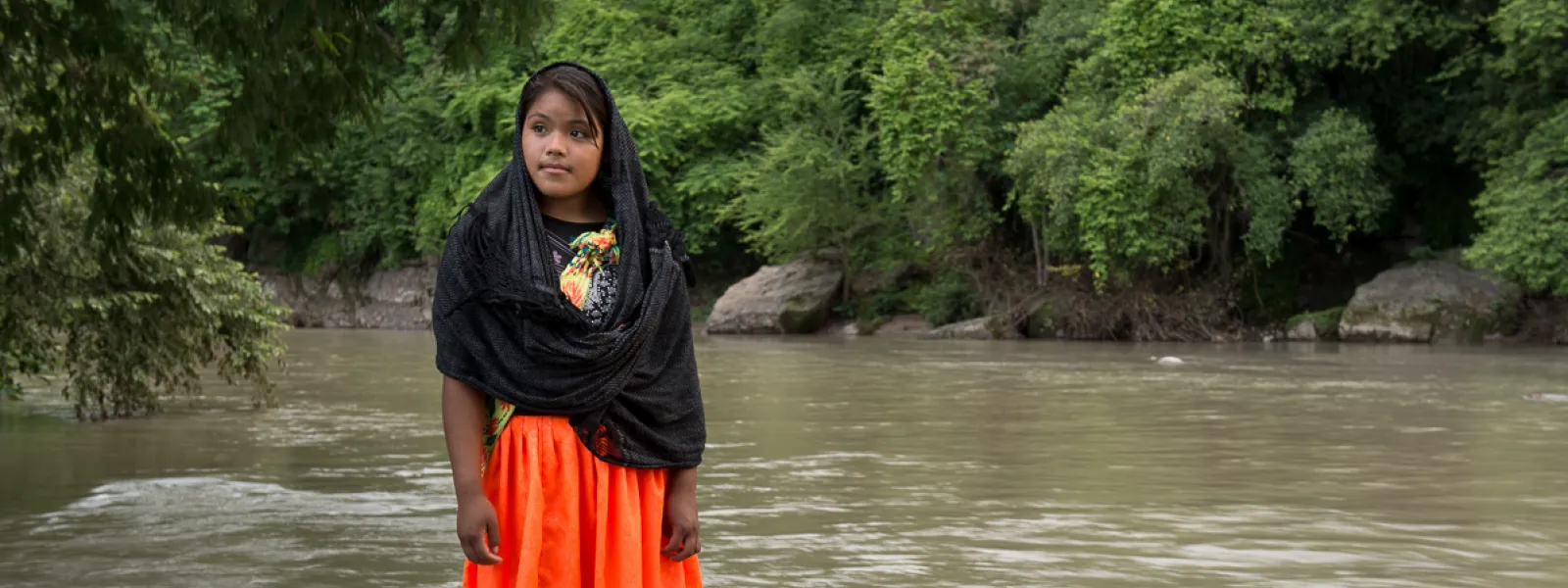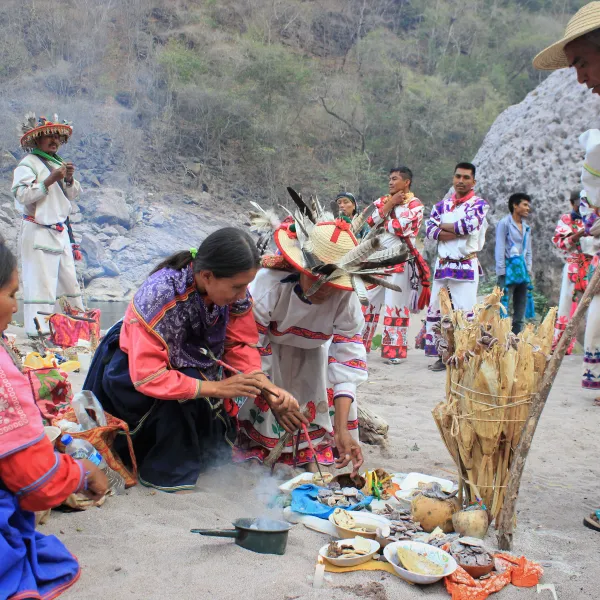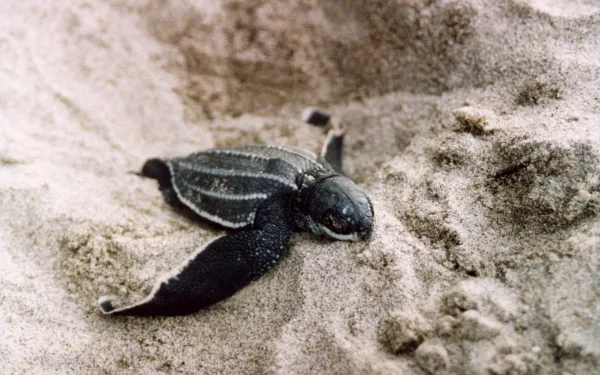
Project
Photo: Jaime RojoSaving the San Pedro Mezquital River from a destructive large dam
If built, the Las Cruces Dam would block the San Pedro Mezquital, the last free-flowing river in Mexico’s western Sierra Madre. It would affect fisheries, agriculture, livestock and other activities that nearly 12,000 families depend upon for survival.
The reservoir would flood the village of San Blasito and impact the town of Saycota. It would destroy an indigenous ceremonial center and 14 sacred sites. And it would restrict the water and nutrients that the river carries to Marismas Nacionales—the National Wetlands—which harbors one of the largest mangrove forests in Mexico.
In September 2014, the Mexican government approved the dam, despite the environmental impacts and without consulting and obtaining consent from affected indigenous communities.
The authorization ignored the technical opinions of national authorities, as well as recommendations from international organizations about the threats the project poses to the environment and human rights.
AIDA is working hand-in-hand with local organizations to support the communities affected by the project in their fight to have their rights respected.
Partners:

Related projects

Organizations call for probe into the murder of Jairo Mora in Costa Rica (Spanish only)
In a letter to Costa Rican General Attorney Jorge Chavarría and René Castro, the minister of environment and energy, local and international organizations expressed deep concern for the murder of Jairo Mora, a young defender of the leatherback sea turtles. He was murdered on May 30, 2013 in Moín Beach, Limón province. The groups said the severity of the crime warrants an immediate and effective investigation to prevent impunity and the repetition of such acts. The following are essential: A serious, impartial, immediate and effective investigation must be carried out to put on trial and punish the individuals responsible for Jairo Mora's murder. Measures must be taken so that the authorities responsible for controlling and monitoring the environment can effectively guarantee the rights of environmentalists, offering adequate support including through patrols to protect natural resources and by earmarking sufficient resources for these purposes. The state must publicly recognize the importance of the work of environmentalists as defenders of human rights, and it must take the necessary measures to stop the violence against them by taking an active position of respect and protection of their rights. In the last paragraph of the letter, the organizations write that “impunity in cases of serious aggression against advocates for defending the environment and natural resources is not only a violation of human rights but also presents a serious threat against environmental sustainability. Therefore, it is necessary for Costa Rica, as a nation committed to defending the environment, to take effective action to prevent such crimes like Jairo Mora's murder don’t go unpunished and don’t happen again.”
Read moreThe city, our ecosystem
By Haydée Rodríguez, legal advisor, AIDA We are witnessing the biggest wave of urbanization in history. More than half of the world’s population lives in cities. The United Nations Population Fund (UNFPA) estimates that five billion people will live in urban zones by 2030 (State of the World Population: 2007).This growth could bring opportunities to improve our lives and fight for environmental sustainability, or it could create more poverty and accelerate the destruction of natural resources. When we talk about the environment it’s easy to imagine a lush greenlandscape or a sunny beach, birds singing and perhaps an animal running free in the forest. It is less likely to visualize a cityscape of asphalt, traffic and honking horns. But it is true that the urban environment also is an ecosystem. Urban ecology: The natural order of cities Urban ecology is a relatively new scientific discipline that seeks to understand how ecological processes function inside urban areas. Unlike other branches of ecology, it requires the collaboration of the social sciences and economics to understand the dominant species of this environment: the human being. In the city, just like in other ecosystems, every aspect contributes toward its definition. The characteristics of urban habitats include traffic, air pollution, population density, movement patterns, the real estate market, infrastructure, transport and natural elements like the availability of clean water, topography and geographic location. Everything surrounding our everyday life – the streets, pavements, parks, buildings, etc. – have been created by humans. The documentary Urbanized analyzes the design challenges in cities, the interaction between different elements and how the environment influences the population. Watch Urbanized trailer. Source: YouTube Beyond chaos: Building sustainable cities Initiatives to promote sustainable cities are on the rise. In the United States, where approximately 250 million people live in urban areas, local governments have created a project called Star Communities - Sustainability Tools for Assessing and Rating Communities (STAR). Through the initiative, each municipality can evaluate the sustainability of their cities in areas ranging from infrastructure to equity and empowerment. Cities can volunteer to join the project by using the methodology for measuring sustainability developed by a multidisciplinary group. To be considered sustainable, STAR requires cities to: 1) Think and take action as a collective system; 2) Be resilient, which is defined as the city’s ability to adapt, recover and evolve in a changing environment; 3) Promote innovation and creativity; 4) Measure the progress of the health and welfare of the people, the environment and the economy; 5) Use resources in a responsible and sustainable way; 6) Collaborate between cities and inpiduals; 7) Promote equity and persity; 8) Inspire leadership; and 9) Seek continual improvement. There is no stopping the progress of growing cities. In Costa Rica, for example, there are ongoing projects like Enamórate de tu ciudad (Fall in love with your city), which aims to improve the quality of life of residents in San José, the capital. Strategies have been put in place to improve safety, promote forms of clean public transport such as bicycles, and hold activities that bring the community together to enjoy the urban environment. City lights shine increasingly brighter across the world. Now is the time to think about what we want our cities to be like. Our urban ecosystem can be an important opportunity for social mobilization (a social process organized and based on dialog to improve our quality of life), education and the empowerment of the population. It can also help us reduce our impact on natural areas and on biopersity. We should seize this positive challenge and dare to see our cities with new eyes.
Read moreMéxico failed to attend the Green Climate Fund’s fourth Board meeting
Senator Ernesto Cordero, Mexico’s representative on the Board, must be held accountable for his failure to attend a key event for establishing financial support for fighting climate change. Mexico City, Mexico. Senator Ernesto Cordero, Mexico’s representative on the Green Climate Fund (GCF) Board, missed the fourth meeting of the entity, held June 25-28 in Songdo, South Korea. At the meeting, Board members started setting the rules of operation of the Fund, a financial mechanism essential for developing countries to secure the financial support needed to combat climate change. According to the GCF Secretariat, Cordero’s absence was because he had to attend important sessions of the Mexican Congress. Also missing at the Songdo meeting was Chile, the alternate member for Mexico. Chile’s representative also informed the Secretariat of his inability to attend the event. With the absence of both of these countries, one of the seats held by Latin America on the GCF Board was left empty. The Board consists of 24 members: 12 representatives from developing countries and an equal number from developed nations. Each member has an alternate who may participate in the Board meetings without voting rights unless they assume the role of the Board member. Latin America has three seats on the Board, broken down by regional groups: Colombia is paired up with Peru, Belize with Cuba, and Mexico and Chile. Each pair also represents other countries. In this regard, Mexico and Chile’s absence from the fourth meeting jeopardizes the interests of the Latin American countries represented by the duo, which includes Brazil and Argentina. It also contradicts the active role Mexico has played in recent years in climate change negotiations worldwide. What is more, a good opportunity was missed to influence the decisions taken in South Korea. The Fund is being developed to become a main source of financial resources to combat climate change, and at this Board meeting critical decisions were taken to this end. These included decisions on the Fund’s mission, the results and performance indicators to follow, procedures for access, home ownership, financial instruments, structure and organization, among others. The formation of the Green Climate Fund must meet the needs of all regions, but especially those in Latin America. Mexico, Chile and the other countries with a seat on the Board must commit to be active and efficient participants, and to be consistent with their national policies on climate change. It is of utmost importance to ensure the involvement of Latin American governments in international spheres like the GCF because this will ensure effective benefits for the people of this region. For more information on the Green Climate Fund, visit this page.
Read more